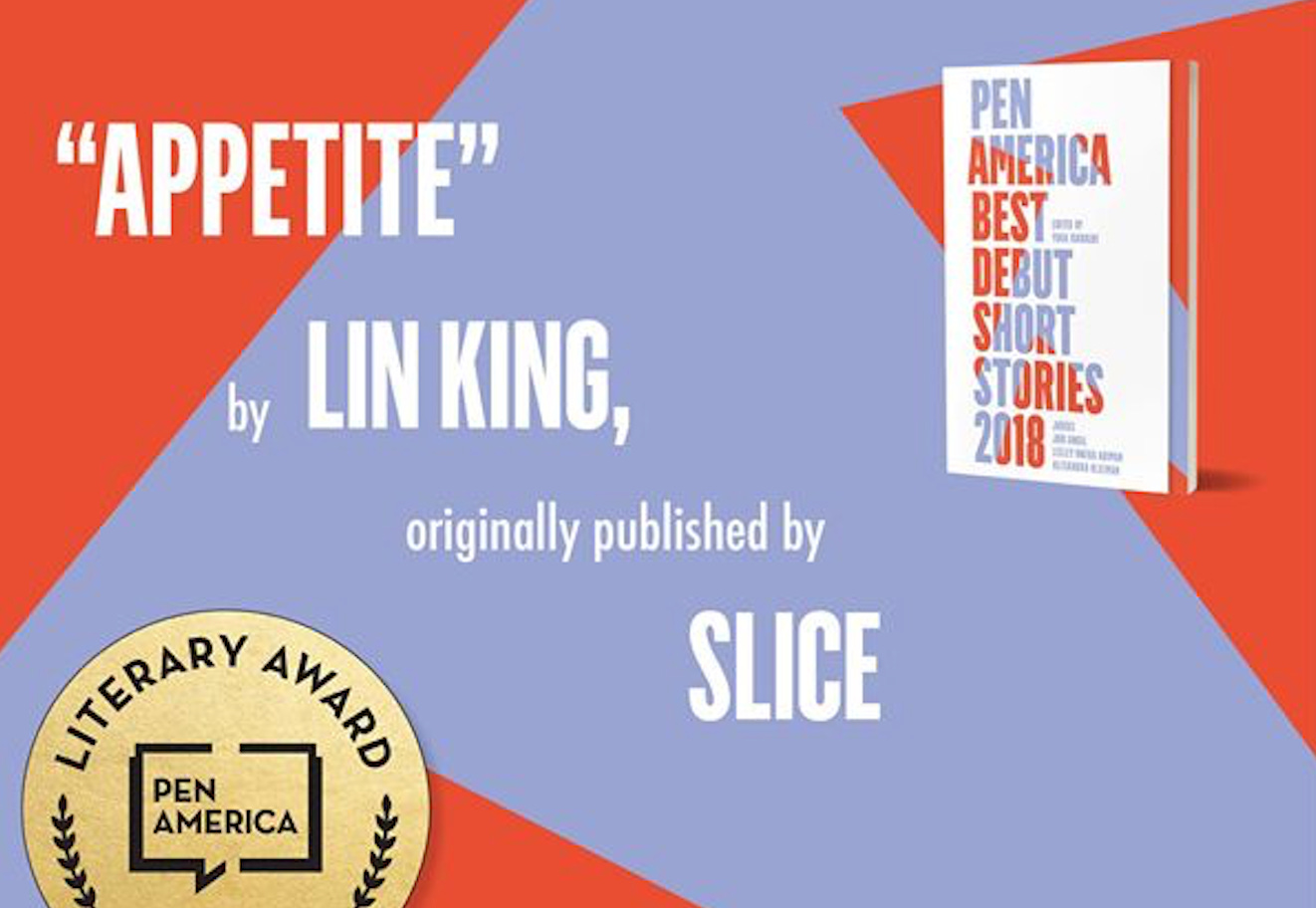In each installment of “The Usonian Interviews,” The Usonian spotlights a new storyteller or artist from a different corner of the globe. This week, The Usonian spoke with writer and literary translator Lin King about her writing process in her respective fields. King’s short story, “Appetite,” was anthologized in PEN America’s Best Short Stories 2018.
This interview has been edited for clarity and length. The views presented by the interview subject are the opinions of the subject and do not represent the views of the author or this newsletter. Browse the full interview archive here.
THE USONIAN: What made you want to be a writer?
LIN KING: My dad wrote when he was young, and still writes. He was published quite a bit when he was younger, and then for survival reasons he went into architecture. But he worked in magazines as an editor and continues to write fiction in his downtime. I was brought up in that environment, and he was always very encouraging of me going down this path. I’m an only child, so I read a lot as a kid, and only had my own imagination to rely on. That was the beginning.
TU: You also mentioned that you’ve been translating literature. What led you to that line of work?
LK: Growing up bilingual, you kind of get these opportunities; people just ask you to translate pieces as favors. When I was in college, there was the option of literary translation. I was like, what the heck does that mean, literary translation? So I took a class.
After college, I was working for an artist who works in New York, but only speaks Mandarin and Japanese. A large part of the job was to translate both verbally and textually. I continue to work with him on catalogs and artist statements. And through that, I’ve tapped into a very small quarter of fine art translation. And I have a few regular artists and organizations that commission certain things. I still do literary translation at Columbia as well. I like translation classes better than fiction.
TU: Why do you say that?
LK: It’s something about how when people are too personally invested, then the [workshop process] becomes less fun. What translation does is create a layer of remove, because somebody else has written the work. The goal is quite clear—to render this thing that exists [from another language] into the best version of itself [in English] as possible. And in that way, it’s a more objective process. Everyone in your workshop is trying to help you toward that end. Whereas in fiction, you have to figure out what the end is first. It’s a muddier process.
TU: What have been some formative moments in your development as a writer?
LK: In college, we were forced to do independent projects. I was working with the creative writing department [at Princeton] on a collection of short stories; in the end, only a couple of them are worth reading, but at least it forced me to generate, if that makes sense.
TU: Tell us about your writing process.
LK: I’m still figuring it out. Sometimes I’m really rigid. I’ll literally time myself and like, force myself to write for a certain number of minutes per month. I tally it with a spreadsheet. Sometimes I just give up entirely, and whatever comes, comes. You hear about these routines that certain writers have, that are rigid and work for them. I don’t think I’ve found that yet. Sometimes I think I found it and then after a while, it doesn’t work. It becomes very oppressive. Maybe that’s an age thing. Maybe as you get more experience, and as life itself settles into routine… but maybe COVID is not the greatest time to find routine.
People break it down into [whether you are] a planner, or are you a spontaneous writer? I think Zadie Smith has this essay where she talks about whether you are someone where every sentence needs to be perfect before you move on to the next one, or do you regurgitate everything that’s on your mind, and then try to find a pattern?
I do better when I plan. But then it seems impossible to plan unless you’ve already done the work.
TU: Tell us about a project you’re working on right now that you’re excited about.
LK: I’ve been working on a novel for a while now. I’m not the type of person to have many projects going on at once. The novel has been the main thing. Translation is where I can multitask, because it’s a completely different field.
TU: What kind of writers do you count as your influences?
LK: It sounds old school, but I like comedies of manners. Jane Austen and Oscar Wilde were my favorite writers in the formative stages and still are probably. But in terms of contemporary writers, I really like a certain level of whimsy, even though I don’t think I necessarily emulate that in my own writing. Unapologetic narrations [such as that of] Jane Gardam. For me, she’s underrated.
I like the rigor of Rachel Cusk. Stylistically, I’m very different. But I admire the single-mindedness of like, this is what my project is going to be and I’m going to commit to it and pull it off.
TU: What advice do you have for young people who want to get into writing or translation?
LK: That’s always hard. When I talk to people who are from a more similar background to mine. I grew up in Asia. I write in English. So for that, I would say, you know, don’t be afraid of writing “what you know,” which is like the most typical thing, but is really resisted among young writers from minority backgrounds. At least when I was young, I felt that nobody would understand that. I [thought] I should write about the American suburbs, which is what I did for many years, and it was great for non-ethnicity-specific characters in generic settings. It [seemed] that the generic is what will connect everybody and make everybody feel solidarity. But my [journey] has been a trajectory toward specificity.
TU: Are you reading anything now that you can recommend?
LK: Recently for a translation class I read this small book called Love, by Hanne Ørstavik, which is remarkable. It’s this incredibly compact book about one night in which a boy and his mother are out and about, and it just toggles between their consciousnesses. And sometimes [the point-of-view shift] happens within the same paragraph, and you see the switch or not. It feels like something that should be a short story as a conceit, but she takes it all the way and it works really well.
TU: One of your most successful short stories is “Appetite,” which was featured in the 2018 PEN America Best Debut Short Stories anthology in 2018. That story is impressive because it tells the story of this woman’s whole life in 5,000 words. As a writer, how do you go about compressing time?
LK: I think the process of that one specifically is that of retracing. Looking at someone who is in their 60s in a particular situation and asking, how might they have gotten there?
I'm always playing with time shifts, and ironically, “Appetite,” which has probably the most chronological-possible timeline, is the one that has done well.
Working with time is always interesting in terms of examining cause and effect. If you see someone at multiple different points in their lives, and you follow them for just a little bit, can you kind of construct the whole arc of their lives? Do the characters make sense as people who don’t just appear as fictional characters, but who actually grow on the page? Can you build someone who’s convincing at every stage of their life, but [they still] add up to one person?
Lin King is a writer, translator, and teacher from Taipei, Taiwan. Her work has appeared or is forthcoming in Joyland, Boston Review, Public Books, The Margins, and Slice, among others, and has won the PEN/Robert J. Dau Short Story Prize for Emerging Writers. She is an MFA candidate and instructor of first-year writing at Columbia University.



